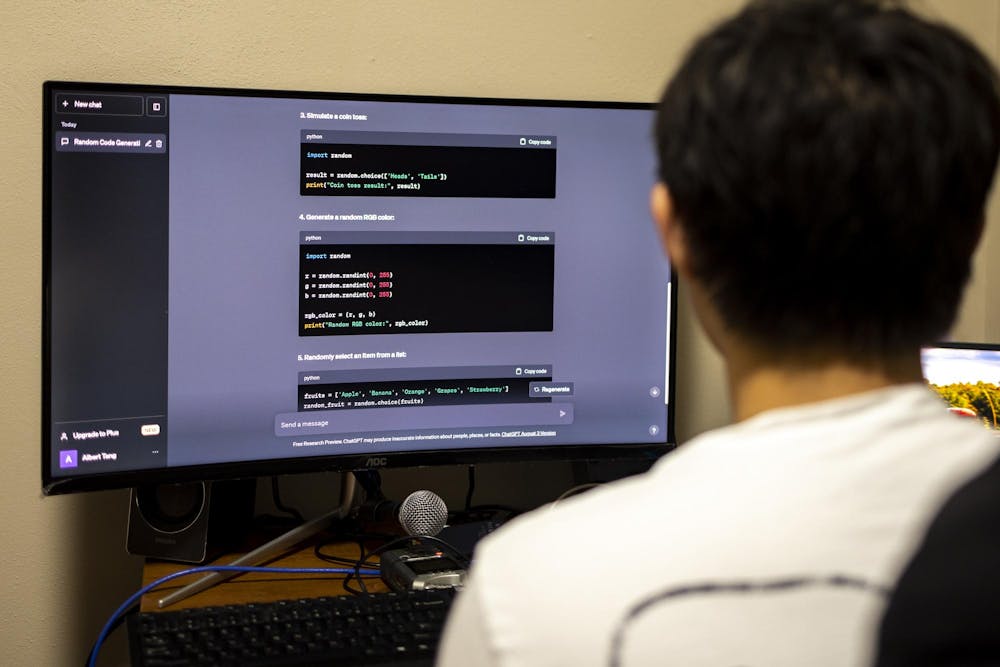With courses underway for the fall semester, the University’s first set of unified guidelines for the use of artificial intelligence in classrooms offer advice on how to ethically and productively engage with the emergent software. Working in conjunction with the Provost’s Office, University Information Technology Services published recommendations, known as the Generative Artificial Intelligence Guidelines, July 8 to help students, teachers and staff use AI technology in a responsible manner.
In the guidelines, the University encourages professors to develop their own policies on how AI technology can be used within their specific classrooms and asks members of the University community to ensure that their applications of the technology align with the University’s broader principles.
One of the first initiatives started by the University to address the creation and advancement of Generative AI technology was the Generative AI in Teaching and Learning Task Force, composed of six faculty members and Gabrielle Bray, former chair of the Honor Committee and Class of 2023 alumna. Created in March 2023, the Task Force hosted a series of virtual town hall meetings to further the community’s understanding of AI technology and draft a series of recommendations that they sent to the Provost’s Office.
One recommendation the task force developed was for the University’s information technology department to investigate AI usage and be clearer about resources that are available. According to Natasha Heny, co-chair of the Generative AI in Teaching and Learning Task Force and associate Education professor, this recommendation likely led to the creation of the guidelines recently released by the Provost’s Office and IT Services.
The new guidelines define generative AI as a computer system able to create new content in response to a given prompt. The guidelines ask the University community to consider the appropriate context for using AI, understand the liability issues and lack of data protection that may come with using individually licensed AI tools and be aware of potential data bias.
Along with the guidelines from IT Services, the Provost’s Office published a page for Frequently Asked Questions among students and faculty regarding generative technology. Other University resources for understanding AI technology include the LibGuide created by the U.Va Library, titled Getting Started with Generative AI, and the Center for Teaching Excellence’s online collection of articles written by professors, which focus on topics such as how to ethically incorporate AI into courses and how to discuss AI usage with students.
“GenAI Tools should not be used blindly for decision making and/or the creation of content without the review of a knowledgeable person, and should never be relied upon for important inquiries,” the guidelines read. “AI Users are expected to recognize the limitations of the GenAI Tools they are using, avoid over-reliance on such tools, carefully review output for errors and remain vigilant to identify potentially erroneous, incomplete or otherwise problematic output.”
While these guidelines offer advice for professors to consider when deciding on AI policies for their courses, according to Deputy University Spokesperson Bethanie Glover, these guidelines are not enforceable, and AI usage within the classroom will be left up to the discretion of the professor. Cheating is a punishable offense under the University Honor Code, reflecting a breach in boundaries established for students by professors, and the failure to comply with a professor’s AI policy may constitute an Honor violation, Glover said.
“U.Va. instructors have been reminded to set clear expectations regarding permitted resources that students may use for their assignments, and as always, students must properly cite the sources used in their work,” Glover said.
The guidelines also encourage students and faculty to use U.Va.-licensed AI programs such as U.Va. Copilot Chat and U.Va. Copilot for Microsoft 365 whenever possible. According to Heny, the Copilot program offers University students and staff free access to generated content without risking privacy concerns such as the sharing of raw data from inputting prompt questions into AI technology.
Looking at the current reality, professors have begun to make their AI policies clear to students by including guidelines in their syllabi and allowing for open discourse about AI within the classroom, according to fourth-year College student Lauren Wisniewski. She said that many of her data science classes allow students to use generative AI to help come up with ideas or brainstorm new approaches to projects, with the requirement that they cite the AI tools they used. Conversely, she noted that some of her other classes ban AI use entirely.
“In the College of Arts & Sciences, they’re a little bit more strict with the AI, so we’re not allowed to use anything,” Wisniewski said. “But [those classes are] a little bit different, because we’re writing reflective papers about our own experiences, so that makes sense.”
Associate Professor of Biology Christopher Deppmann compares AI technology to growing up with smartphones in his generation — the technology appears foreign at first but with time and adjustment it becomes natural. According to Deppman, AI technology is not going away anytime soon and we must learn the ethics and etiquette of this technology in order to take full advantage of its possibilities.
While some professors are more restrictive in their AI policies or outright forbid its use, Deppman invites students to use AI as much as possible within the classroom as a learning aid. He said that if used ethically and effectively, AI can help facilitate learning by helping students answer questions and take interactive notes. As such, he encouraged his fellow professors to make use of AI technology in their classrooms as well.
“Universities have generally been caught a little flat footed on the frontier of this type of technology and I think as professors, we really need to up our game and use these things to make our classes even better,” Deppmann said. “I think we should be offering [students] really profound experiences, and we should use all the tools that we have at our disposal to do that.”







